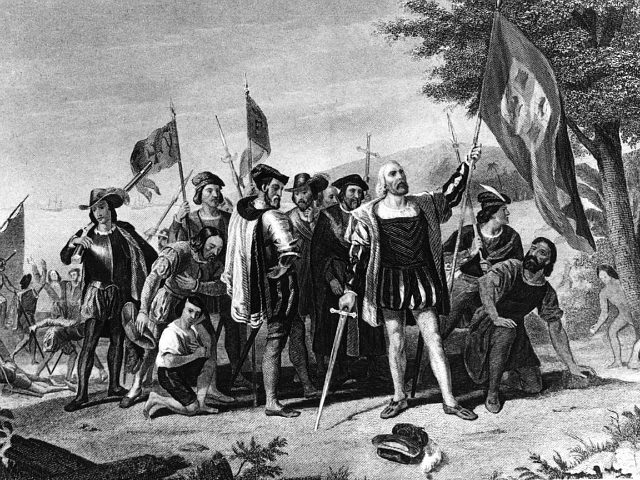The Republican mayor of Waterville, Maine, issued a proclamation declaring October 14 “Columbus Day” in his city as he bucked a new state law that renamed the holiday “Indigenous Peoples’ Day.”
Mayor Nick Isgro posted the proclamation on Facebook:
Posted by Waterville Mayor Nick Isgro on Friday, October 11, 2019
“The arrival of Christopher Columbus on the shores of the New World in 1492 marked the beginning of relations between the Americas and the rest of the world, and opened the doorway to knowledge and exploration known as the Age of Discovery,” the proclamation begins and continues:
After Columbus, millions of European immigrants brought their art, music, science, medicine, philosophy and religious principles to America, which contributions have helped shape the United States and include Greek democracy, Roman law, Christian ethics and the belief that all men are created equal.
Isgro’s proclamation states Columbus was a “skilled navigator and man of Faith” who “transformed the western hemisphere” and inspired other pioneers.
“The accomplishments of Columbus through his courage and willingness to take unknown risks in exchange for discovery, knowledge, and greatness has trickled down through each generation of Americans,” Isgro’s proclamation states, observing also that honoring Columbus also honors “Italian Americans … our nation’s fifth largest ethnic group.”
“I, Nicholas Isgro, Mayor of Waterville, do hereby proclaim Monday, October 14th, 2019, Columbus Day, and urge all of Waterville’s residents to celebrate this day with appropriate ceremonies and remembrances, and to commemorate and honor all of those who have contributed to our diverse shared history,” the mayor declared.
In response to Isgro’s proclamation, Kirk Francis, tribal chief of the Penobscot Nation, said, according to centralmaine.com, “This whole issue of turning Columbus Day into Indigenous Peoples Day was a real recognition and acknowledgement of the state’s first peoples, and I think this is not about Indian people and Italian Americans.”
“This is about one individual that, in our mind, caused a lot of destruction when he came in terms of genocidal acts and raping and pillaging their way through Indian land,” he added.
Additionally, Maulian Dana, Penobscot Nation tribal ambassador, accused Isgro of having “a history of not liking inclusivity.”
“I know that he is kind of known for white nationalist tendencies and ideologies,” Dana continued, “and I think that’s what we’re seeing here.”
In April, Democrat Gov. Janet Mills signed LD 179 into law, replacing Columbus Day in Maine with “Indigenous Peoples’ Day.”
“Our history is by no means perfect,” Mills said in a statement as she was joined by tribal leaders at the signing of the legislation into law. “But, for too long, it has been written and presented in a way that fails to acknowledge our shortcomings.”
“Today, we take another step in healing the divisions of the past, in fostering inclusiveness, in telling a fuller, deeper history, and in bringing the State and Maine’s tribal communities together to build a future shaped by mutual trust and respect,” the governor added.
The Maine State Museum lists resources to guide discussion about the name change, including those offered by the Zinn Education Project’s Indigenous Peoples’ Day — based on socialist Howard Zinn’s A People’s History of the United States that has sold more than 2.5 million copies and has been offered as “history” in public schools for decades.
The Zinn Education Project says it provides “lessons, books, and films for teaching the truth about Columbus and Indigenous Peoples history.”
The project refers readers to a book titled Rethinking Columbus, edited by Bill Bigelow and Bob Peterson, that asserts Christopher Columbus should be revisited “because the Columbus myth is a foundation of children’s beliefs about society.”
“The murky legend of a brave adventurer tells children whose version of history to accept, and whose to ignore,” a summary states. “It says nothing about the brutality of the European invasion of North America.”
However, in Debunking Howard Zinn: Exposing the Fake History that Turned a Generation Against America, scholar Mary Grabar notes in her chapter titled, “Columbus Bad, Indians Good”:
The truth is that Zinn’s description of Columbus’s first encounter with the American Indians is lifted from Columbus: His Enterprise: Exploding the Myth, a book for high school students that Zinn’s friend and fellow anti-Vietnam War activist, Hans Koning, first published in 1976. In other words, though one of Zinn’s radical America-hating colleagues did the initial work of smearing Columbus, Zinn got the credit.
Grabar noted the political agenda advanced by both Zinn and Hans Koning did not go unnoticed by media of many leanings.
In its obituary for Koning in 2007, the New York Times, observed Grabar, said he had created an “’emotional firestorm’ by portraying Columbus as ‘a deep-eyed [sic] villain, raping, pillaging and enslaving as he ruthlessly pursued profits.’”
She continues that “Koning’s book was panned by commentators and historians who took notice of the change in tenor as the five hundredth anniversary of the discovery of America approached in 1992.”
At the Independent, Harvey Morris wrote in anticipation of Columbus Day that year that Koning was a “historical reductionist,” who “refuse[s] to accept any nuances in the character or context of Columbus’s life.”
According to Grabar, Morris said Koning engaged in “the cliché of comparing him [Columbus] to Hitler and the Nazis.”
“So, Zinn based his famous opening pages on a controversial book,” Grabar writes. “And while Koning’s work was treated dismissively, Zinn’s transcriptions of Koning’s material to his own book are taken as groundbreaking historical revelations.”
“And few know that they are little more than transcriptions,” she asserts.

COMMENTS
Please let us know if you're having issues with commenting.